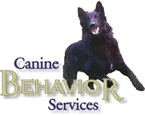 Making the Most of Puppy Training: Coming When Called Making the Most of Puppy Training: Coming When Called
Greetings to all our longtime readers, and welcome to our new ones! And thanks for your patience over the last few months. As some of you know, my husband and I moved cross-country over the summer, from West Virginia to Oregon, and between the preparation for the move, the move itself, and the seemingly endless "settling in" process, there has been little time for writing! On the bright side, our recent adventures have given me plenty of ideas for future training tips :-) So, getting back to it, this week we are talking puppies. As Christmas is, for better or worse, a major time for purchase and adoption of puppies, I thought some proactive puppy training thoughts would be in order. Hopefully, when Spring comes around, and everyone's pups suddenly "need training" because they're "starting to challenge" their new owners, you will be ahead of the game! And what's the number one issue I get calls about from frustrated puppy owners? Their formerly compliant pup, typically around 3 or 4 months old, won't listen, particularly when called to come. Well, let's talk about that!
There is an important fact new puppy owners need to realize: at 11-12 weeks old, puppies graduate from the "invisible leash" stage, following at your heels as if you are their entire world, to the "spread your wings" stage in which emerges a strong a need to explore their world. Fascination with the environment suddenly takes precedence over security, and puppies find out that exploration is a joy of its own. So don't take it personally when your loyal wee puppy finds you somehat less relevant than the leaf blowing fitfully down the trail! This is not a sign that your puppy is challenging your authority, but a natural, necessary part of puppy development.
If you can keep these do's and don'ts in mind, you should get through the next few months in good form:
- Canines will generally follow another's direction of movement. Move away from your dog, and he will move toward you. Use this to your advantage! Trotting away from your puppy as you call "come" will encourage him to come snappily; running away will get him to you even faster! Bending down and patting the ground, slapping your legs, or clapping your hands all make you look smaller, less intimidating, and therefore more inviting. Try each and see what works best for your puppy!
- Always praise and make a happy fuss when your pup comes when called -- ALWAYS. Not just when he's a puppy, either - his whole darned life! If you have a breed that tends to be independent (terriers, for instance), or easily distracted (scenthounds come to mind), or has strong chase drives (herding breeds and sighthounds will be inclined to chase anything that moves), you may wish to super-charge your praise by following it frequently with a tangible reward, like a favorite treat or game. Think of the time and effort you spend reinforcing coming when called as an investment: the more you put into it now and as your pup matures, the bigger the dividend later! I can't think of a much nicer behavior than reliably coming when called.
- Conversely, please never, ever punish a dog that returns to you -- ever, no exceptions, no kidding! You will always be punishing the dog for returning to you, period. It doesn't matter what the pup did prior to coming back. When he comes when called, he is right. Let go of the human need to "make sure he knows he was wrong" (for ignoring "come" the first 12 times you called, for instance), and focus on teaching your pup that coming is always right, and being right will always be a happy, safe, and rewarding experience!
- Avoid falling into the admittedly alluring trap of chasing your puppy. They seem to enjoy it so much! Realise that canine of all ages consider the game of chase a very rewarding one for whoever is out in front. So when you chase him, whether in play, or because he stole your socks, or while trying to catch him when he brings that toy just out of reach, you are actively reinforcing the notion that running away from you is a good thing. I can't speak for you, but this is not something I want my dogs to learn. If you want to play chase with your pup, have him chase you! This is also good fun, plus it teaches your pup to follow your lead, not the other way around.
- Finally, this is not the age to "test" off-leash coming in unfenced, unfamiliar areas. Not only may you teach your pup to ignore you in those places, you risk your pup getting lost or hurt. When away from home or in any unsecured area, use some sort of leash. When out hiking and playing in new territory, I make frequent use of 30-50 foot long lines, which can be purchased at pet supply stores or home-made with light poly cord and a snap bolt tied securely to one end. This way the pup (or come-challenged adult dog) can have freedom to explore, but not the freedom to run off or decide he is too busy to listen. On a long line, coming from a distance can be safely practiced and rewarded - and this is a great lesson for a puppy to learn!
Good luck with those new puppies. They are so fun, and so full of potential!
Until next week, Happy Training!
julie
Julie Cantrell BSc, CPDT-KA, CDBC
Canine Behavior Services
www.k9behaviorservices.com |

